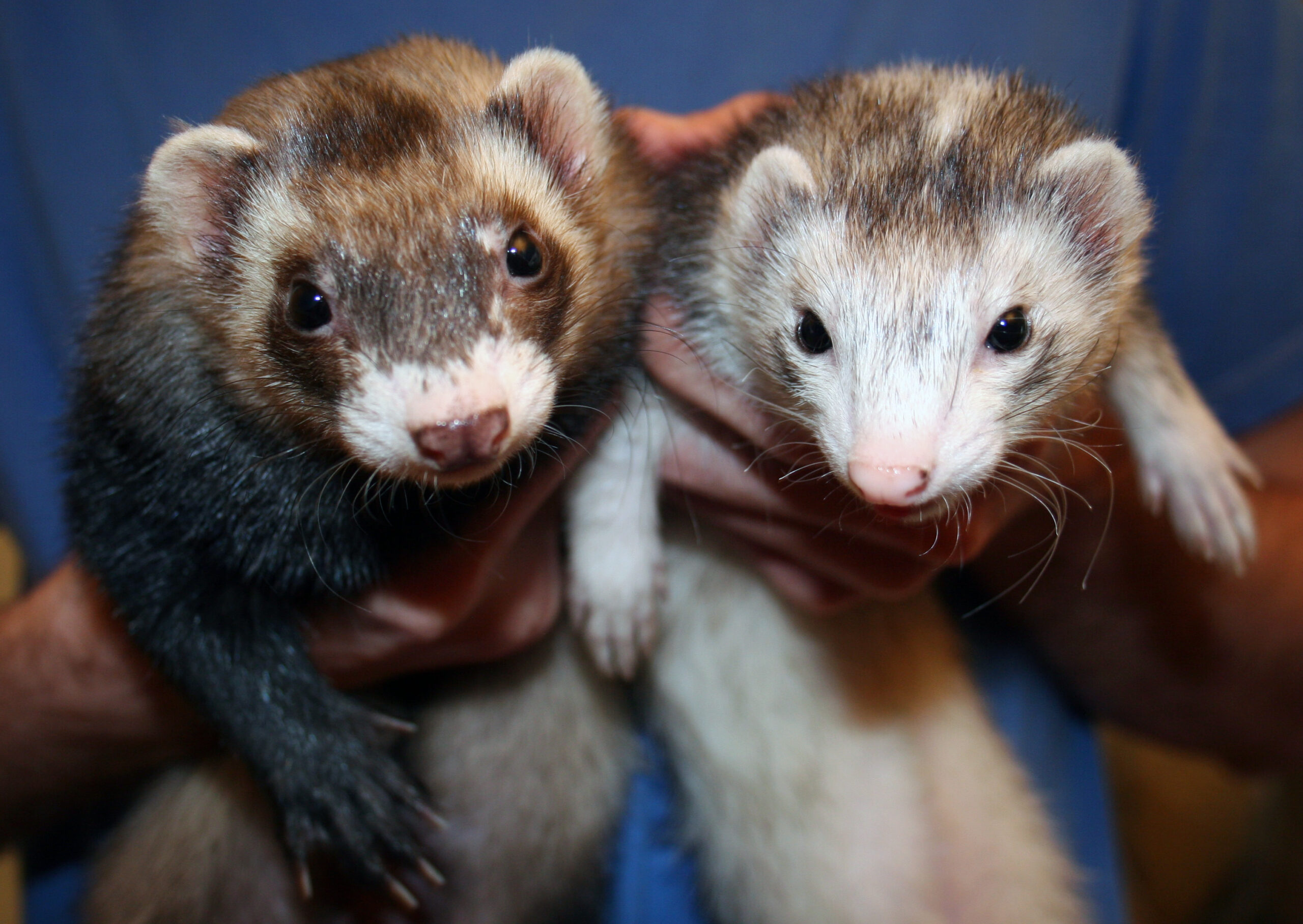Ferrets are energetic, curious, and playful companions that have become increasingly popular as pets. While they are small in size, they have big personalities and require dedicated care to keep them happy and healthy. If you are considering adopting a ferret or already own one, it’s essential to understand their housing, diet, health needs, and socialization requirements.

This guide will walk you through everything you need to know about ferret care, from setting up their habitat to ensuring they live a long and fulfilling life.
1. Understanding Ferrets: Are They Right for You?
Before getting a ferret, it’s important to understand their unique needs and characteristics:
✔ Lifespan: Ferrets live 6–10 years with proper care.
✔ Social Nature: They are highly social and do best in pairs or small groups.
✔ High Energy: Ferrets need daily exercise and playtime outside their cage.
✔ Curious and Mischievous: They love to explore and can get into tight spaces or steal small objects.
✔ Sleep Schedule: Ferrets sleep 14–18 hours a day, usually in short bursts.
Ferrets are not low-maintenance pets. They require daily care, supervision, and plenty of interaction. If you are looking for a pet that stays in a cage all day, a ferret may not be the right choice for you.
2. Setting Up a Proper Habitat
Ferrets need a spacious and secure habitat to keep them comfortable and safe.
A. Choosing the Right Cage
A good ferret cage should be:
✔ Multi-level with ramps and platforms – Ferrets love to climb and explore.
✔ Large enough for exercise – Minimum 24 x 24 x 36 inches for one ferret.
✔ Secure with small bar spacing – Prevents escapes, as ferrets can squeeze through tiny gaps.
✔ Well-ventilated – Avoid aquariums or plastic enclosures that restrict airflow.
B. Bedding and Sleeping Area
Ferrets love to burrow and need soft bedding. Ideal options include:
✔ Fleece blankets
✔ Hammocks – Many ferrets love sleeping in hanging hammocks.
✔ Small enclosed beds or boxes – Provides a cozy, den-like sleeping space.
Avoid cedar or pine shavings, as they can cause respiratory problems.
C. Litter Box Setup
Ferrets can be trained to use a litter box, but they are not as reliable as cats. Use:
✔ A high-back litter pan – Prevents messes.
✔ Pellet-based or paper-based litter – Safe and absorbent.
✔ Multiple litter boxes – Place them in corners where your ferret naturally goes.
D. Ferret-Proofing the Cage
✔ Remove plastic objects or small items that could be swallowed.
✔ Ensure all doors latch securely to prevent escapes.
✔ Place food and water away from the litter box for hygiene.
3. Ferret Diet and Nutrition
A. What Do Ferrets Eat?
Ferrets are obligate carnivores, meaning they require a diet high in animal protein and fat. Their diet should include:
✔ High-quality ferret kibble – Contains 35–40% protein and 15–20% fat.
✔ Raw or cooked meats (as treats) – Chicken, turkey, or eggs in small amounts.
✔ Occasional freeze-dried raw food – Adds variety to their diet.
B. Foods to Avoid
Ferrets cannot digest plant-based foods or high-carbohydrate foods. Avoid:
✖ Fruits and vegetables (can cause digestive issues).
✖ Dairy products (ferrets are lactose intolerant).
✖ Sugary treats (can lead to insulinoma, a common ferret disease).
✖ Dog or cat food (not nutritionally suitable).
C. Providing Fresh Water
Always provide fresh water in a bowl or bottle. Bowls are preferred as some ferrets don’t like using water bottles.
4. Exercise and Playtime
Ferrets are high-energy animals that need several hours of playtime outside their cage each day.
✔ Ferret-Proof a Play Area – Block off small spaces where they could get stuck.
✔ Provide Tunnels and Toys – Ferrets love to run through tubes, chase balls, and play with soft toys.
✔ Rotate Toys Regularly – Keeps them mentally stimulated.
✔ Supervise Their Play – Prevents accidents or chewing on unsafe objects.
Some ferrets enjoy playing with other pets, but always introduce them slowly and supervise interactions.
5. Grooming and Hygiene
Ferrets require regular grooming to stay clean and healthy.
A. Bathing
Ferrets naturally have a musky odor, but frequent baths can dry out their skin. Only bathe them once every 1–2 months or if they get very dirty.
✔ Use ferret-safe shampoo.
✔ Dry them thoroughly after a bath.
B. Nail Trimming
Ferrets’ nails grow quickly and need trimming every 2–3 weeks. Use small pet nail clippers and trim carefully to avoid the quick.
C. Ear Cleaning
Ferrets produce earwax, which should be cleaned monthly using a ferret-safe ear cleaner.
D. Dental Care
Ferrets can develop dental disease, so brush their teeth weekly using a ferret-safe toothpaste.
6. Socialization and Training
A. Handling and Bonding
Ferrets are social animals that need daily interaction with their owners. To build a bond:
✔ Handle them gently and frequently.
✔ Give them treats for positive reinforcement.
✔ Allow them to explore and interact with you.
B. Litter Training
Ferrets can be trained to use a litter box, but accidents may still happen. If your ferret goes outside the box:
✔ Place a litter box in their preferred corner.
✔ Reward them when they use it correctly.
✔ Clean accidents with enzyme-based cleaners to remove scent traces.
C. Teaching Basic Commands
Ferrets can learn commands like “come” and “no” with positive reinforcement. Treats and repetition help reinforce good behavior.
7. Health and Veterinary Care
Ferrets are prone to specific health conditions, so regular vet visits are crucial.
A. Common Ferret Health Issues
✔ Adrenal disease – Causes hair loss and hormonal imbalances.
✔ Insulinoma – A pancreas tumor that affects blood sugar levels.
✔ Dental disease – Due to lack of dental hygiene.
✔ Digestive blockages – From swallowing objects like rubber or fabric.
B. Veterinary Care
✔ Annual check-ups – Ensure overall health.
✔ Vaccinations – Protect against rabies and canine distemper.
✔ Spaying/Neutering – Recommended to prevent health and behavioral issues.
Find a vet experienced with ferrets to provide proper care.
8. Are Ferrets the Right Pet for You?
Before adopting a ferret, consider:
✔ Do you have time for daily interaction and play?
✔ Can you provide a large, secure enclosure?
✔ Are you prepared for veterinary costs and potential health issues?
✔ Do you understand their dietary and grooming needs?
Ferrets are fun, intelligent, and affectionate pets, but they require dedicated care and commitment. If you’re ready for the challenge, they can be one of the most rewarding small pets to own!
Would you consider adding a ferret to your family? Let us know in the comments! 🐾




























